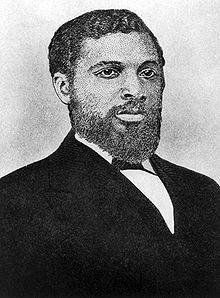Social Justice Activists | James T. Rapier
 James T. Rapier was born on November 13, 1837 in Florence, Alabama to John and Susan Rapier. James’ father was a successful barber and the family was among a small group of African Americans not enslaved in the South.
James T. Rapier was born on November 13, 1837 in Florence, Alabama to John and Susan Rapier. James’ father was a successful barber and the family was among a small group of African Americans not enslaved in the South.
At the age of 19, Rapier’s father sent him to live in North Buxton, Ontario, Canada where a number of former (fugitive) slaves lived and where he could continue his education at the Buxton Mission School and, later, at Montreal College where he studied law. Rapier also traveled to Scotland to attend Glasgow University before returning to the United States to attend Franklin College in Nashville, Tennessee and obtaining a teaching certificate in 1863.
After the Civil War, Rapier returned to Alabama and became an advocate for civil rights. In 1867, he served as a delegate to Alabama’s Constitutional Convention avidly promoting an alliance between former slaves and poor whites. He played a prominent role in the formation of Alabama’s Republican Party, writing its first platform, which called for labor unions, a free press, and public education.
As an advocate for Black economic empowerment, Rapier, in 1869, represented Alabama at the National Negro Labor Union Convention where he became the Union’s vice-president. In this role, he helped found the Labor Union of Alabama, which urged the establishment of a federal agency to help former slaves acquire land. At this time, Rapier also established the Montgomery Republican State Sentinel, Alabama’s first African American owned and operated newspaper.
In 1872, Rapier was elected to the House of Representatives from Alabama’s second congressional district. In the House, Rapier strongly and eloquently supported the Civil Rights Bill of 1875. Standing before the House of Representatives, Rapier stated that even as a member of that body, “there is not an inn between Washington and Montgomery . . . that will accommodate me . . .”
Rapier lost a re-election attempt in 1874, but was appointed as an IRS collector by the Republican Presidential Commission, a post he held until shortly before his death. James T. Rapier died of pulmonary tuberculosis in 1883 and is buried in Calvary Cemetery, St. Louis, Missouri.